- Home
- Helen Peters
Evie's Ghost Page 3
Evie's Ghost Read online
Page 3
“Yes, Mrs Hardwick,” I parroted with heavy sarcasm.
“Evie, is it?”
“Yes, Mrs Hardwick.” My sarcasm was wasted on her. She didn’t even seem to notice.
“And your surname?”
“Tregarron.”
She wrinkled her nose as if the word had a nasty smell. “Funny name, Tregarron.”
“It’s Cornish,” I said. People often comment on my unusual surname. “There’s only one family with that name. They came from this tiny Cornish hamlet.”
Mrs Hardwick frowned. “You haven’t travelled from Cornwall, surely?”
“No, I’m from London. My family left Cornwall hundreds of years ago.”
“Well, you look clean and strong enough. Show me your teeth.”
“What?”
“Come along,” she said with an impatient gesture. “Open your mouth.”
“What? Who are you, a dentist or someth—Aarrgghh!”
As I was speaking, she actually lunged for my mouth and pulled my jaws apart. I tried to bite down on the bony interfering fingers, but her hands were unbelievably strong. After a few seconds, she withdrew her fingers.
“Good teeth,” she said. “You’ll do. No more of your cheek, mind. Cocky little madam, aren’t you? But we’ll soon work that out of you.”
She started to walk out of the room.
“Mrs Hardwick,” I called.
She turned. “Well?” she snapped.
“I’m not doing this washing-up now. It’s too late and I’m tired. I’ll leave it to soak and do it in the morning.”
And by the morning, I thought, hopefully everything will be back to normal and I won’t have to deal with it.
Mrs Hardwick took a step forward. The expression on her face actually scared me.
“What did you say?”
Her voice was very quiet. Quiet and deadly.
“I said I’ll do it in the morning.”
In a flash, she lifted her hand and smacked me hard on the side of my head. I stared at her, open-mouthed, tears springing to my eyes from the shock of it.
“You hit me!” I shouted. “You actually hit me! That’s against the law!”
In response, she smacked me again.
“I don’t know what sort of situation you’ve come from, young lady,” she said, her blue eyes icy, “but in this house, servants obey their superiors. Now, get on with your work.”
And she walked out of the room, leaving me gaping after her.
My head throbbed and my neck ached where the slap had jarred it. Please let this be a dream, I prayed. Please let me wake up now.
I pinched my arm. It hurt, but it didn’t wake me. But it had to be a dream.
I looked at the disgusting heap of washing-up. Maybe I could just run away.
I went to the door and tried to open it. But it was bolted and padlocked at the top and bottom. I tugged uselessly at the bolts.
“Had enough already?”
I turned to see Polly standing in the doorway. She laughed.
“Can’t say I blame you. This your first position?”
“Er…”
“Your first time in service?”
I looked at her blankly. “I don’t know what you mean. I don’t understand any of this. I’m not meant to be here. I don’t even know where I am.”
She looked sympathetic. “Taken from the workhouse, was you?”
“No! I was taken from my mum. But I’m staying with my godmother. I don’t know how I ended up here.”
“Oh, that’s tough,” said Polly. “But don’t worry. There’s worse places to work. How old are you?”
“Thirteen.”
“Same as me. It’s murder at the beginning, but you’ll get used to it. You won’t usually have to wash pots, that’s one blessing. It’s only when there’s a big party on, we have to turn our hands to anything then. And what with poor Nell taking sick…”
“Who’s Nell?”
“Scullery maid. Just standing at the sink she was, and fainted dead away. No wonder – she’d been washing pots and pans for six hours without a break. I tell you straight, I’m right glad they don’t give parties too often. And I’m glad you turned up too. I’m rushed off my feet doing the bedrooms, without this lot to wash as well.”
Polly was so nice that she made me feel a bit calmer. Maybe it wouldn’t kill me to do a bit of washing-up. Just this once, obviously. I might as well get on with it and just hope that things went back to normal very soon. I really didn’t fancy spending any more time in this dream, or nightmare, or hallucination, or whatever crazy madness it was. But if I thought about it too much, I would completely freak out. So perhaps it would be better to have something to keep me occupied until the madness went away.
There were two sinks in the centre of the draining board. One seemed to be made of stone and the other was lined with metal. But there were no taps anywhere.
“Er … Polly, where do I get water from?”
“Cold from those buckets there,” said Polly, indicating two metal buckets full of water on the floor under the sink. “Hot from the copper on the range.”
“And the washing-up liquid?”
Polly looked at me as though I was speaking a foreign language.
“Come again?”
“The washing-up liquid. Where is it?”
“You don’t half talk funny,” said Polly. “Down from London, are you?”
“How did you know?”
“Well, you’re not from round here, are you?” She looked curiously at my face. “You look too healthy for a Londoner. What you doing in Sussex? Is there no work in London these days?”
“No, it’s just… Well, my mother got married and she didn’t want me around, so she sent me to the country.”
Polly made a sympathetic face. “Hard luck.”
I wasn’t sure whether her sympathy was for my mother’s callousness or for my having to come to the country, or both. But either way, it was nice to feel that somebody cared.
I asked for the washing-up liquid again, speaking as slowly and clearly as I could, and trying to make my accent sound like Polly’s. But she still didn’t understand. So I just said, “What should I use to wash the dishes?”
Polly bent down and opened the cupboard under the sink. She took out a bowl filled with a gritty-looking paste. I dipped my finger in it tentatively and sniffed. It smelled of vinegar.
“What is it?”
Polly stared at me. “Have you never washed pots before?” She glanced at my hands. “Those hands don’t look like you’ve washed pots. They’re lady’s hands, they are.” Her look of curiosity turned to one of sympathy. “Fallen on hard times, have you? Come down in the world?”
“A … a bit, yes.”
“Oh, that’s a shame,” said Polly. “Don’t you worry now. I’ll look after you.”
She stood the bowl of paste on the windowsill behind the sinks. “Sand, salt and vinegar, that is. The copper pans come up lovely with that and a bit of elbow grease. That’s only for the outsides, mind. You do the insides with this.” She pulled out another dish. “Sand, salt and soap.”
“Is there a brush?”
Polly opened a drawer full of rags. “Cloths in there. Come and get yourself some hot water.”
She picked up an empty bucket and I followed her to the kitchen. On one side of the fire was an enormous copper tank with a tap at the front. “Fill your bucket here,” she said. “I’ve been topping up the copper all evening, so there’s plenty of hot water. Dry the pans as you go along. There’s drying cloths in the scullery. Then you put them back on the shelves.” She pointed to the wide shelves running along both sides of the kitchen, with dozens of gleaming copper pans on them, arranged in size order. “In the right places, mind, and upside down, so the insides don’t get sooty. And leave them hanging over the edge a bit to let them air. You’ll catch it from Cook if you don’t do that. Now, I need to go and see to the bedroom fires, or Hardwitch will skin me alive.”
“Mrs Hardwick. The housekeeper. A right piece of work, she is. Have you not met her yet?”
“Oh, yes,” I said bitterly. “I’ve met her all right.”
Polly laughed and scurried out of the kitchen. When she reached the door, she turned. “I’m glad you’re here, Evie. It won’t half be good to have another pair of hands around the place. It’s been hell since Eliza went.”
I stared after her, light-headed. This must have been how Alice in Wonderland felt when she tumbled down the rabbit hole. I wanted to make sense of things but it was impossible.
So I didn’t even try. Instead, I turned off the tap on the copper and picked up the bucket. It weighed a ton. I lugged it out to the scullery, put the plug in, heaved up the bucket and poured the hot water into the sink.
CHAPTER SIX
The Ball
As I stood in front of the dark, curtainless window, scrubbing my way through the mountain of pans and utensils, I heard people bustle in and out of the kitchen. There was more washing-up going on in another room nearby; I heard the rattle of cutlery and occasional bursts of men’s voices, singing or laughing. One of the voices might have been George’s. But nobody came into the scullery.
My eyelids began to droop. I could almost have fallen asleep right there, standing at the sink. Only the stinging pain in my hands from the sand and vinegar kept me awake.
“Psst. Evie.”
I turned to see Polly in the doorway, her eyes full of mischief.
“Do you want to go on an adventure?” she whispered.
“What sort of adventure?”
“Upstairs. To the Great Hall. We’ll just peek around the door. They’ll be so drunk by now they won’t notice.”
Even though I was exhausted, I couldn’t resist the idea of spying on an actual ball. It would certainly beat washing-up. And since I had somehow ended up in this crazy situation, I might as well play along with it for the moment.
I patted my sore hands dry on a tea towel and followed Polly up the stairs and along a wood-panelled corridor. As we moved closer to the babble of noise, I heard violins playing classical music, almost drowned out by the sounds of talking, laughter and clinking glasses.
Polly stopped by the open door of the Great Hall. “Follow me,” she whispered. Not that anyone would hear her above the noise.
I stayed close behind her as she darted around the doorway and pressed herself against the wall behind a wooden screen. She crouched down and indicated for me to do the same. The wood was carved into a sort of lacy pattern, so when we pressed our eyes to the holes, we got a pretty good view into the crowded room.
It was such a kaleidoscope of colour and light and movement and sound that it was hard to pick out details at first amid the whirl of costumes and dancing and music and voices. And the smell was like nothing I’d ever smelled before. Woodsmoke, candles, flowers, spices and strange musky perfumes all mixed with the powerful stench of body odour.
The women looked amazing. They wore low-necked, high-waisted long silk dresses, with beautiful sashes and embroidered bags and shoes. They carried lace fans, and their jewellery sparkled in the candlelight.
On a carved wooden balcony at the far end, a group of musicians played, and down the centre of the room a line of couples danced an old-fashioned country dance. In a corner by the huge log fire, older people played cards at little candlelit tables.
George, the grey-wigged man who had frogmarched me into the kitchen earlier, and another man dressed identically to him, were clearing a long table under the window, collecting up the remains of puddings, a couple of chicken carcasses and dirty dishes strewn with meat bones. The sight of the puddings made my mouth water. I had eaten nothing since that stale slice of bread and Marmite in Anna’s flat. I couldn’t believe that was only this evening. It felt like it was in another world. What in the name of all the planets was happening to me?
Polly nudged me and pointed. “See that fat man with the blond hair and red face, standing by the table there?”
I nodded.
“That’s Mr Ellerdale,” she murmured. “Friend of Sir Henry. They say he wants to marry Miss Fane.”
Miss Fane. Why did that name sound familiar? Then I remembered, and a shiver of recognition ran through me.
“Miss Fane?” I asked. “Sophia Fane?”
Polly nodded.
Ideas and questions flooded into my head, jostling for space, one pushing forward and then being shoved aside by another, making me dizzy.
All this crazy stuff that was happening to me … was it somehow all connected with the girl at the window? Could that girl have been Sophia Fane?
The girl had asked me to help her.
I went cold all over.
Was that what had happened? Had I gone back in time to help her? To change her fate?
But that was crazy. Completely ridiculous. People didn’t travel in time.
And yet … look what was happening to me right now.
But it couldn’t be time travel. It just couldn’t. However real it all seemed, it had to be some sort of dream. It just had to. All the upheaval – Mum getting married, and being sent away, and Anna’s weird flat, and the story of Sophia Fane – all of that must have just caused me to have some incredibly vivid dream.
Polly’s voice broke into my thoughts. “Mr Ellerdale’s filthy rich. Owns half the county, they say.”
So this was the man Sophia’s father wanted her to marry.
I studied Mr Ellerdale. He was talking to a thin, worried-looking woman while brandishing a large bone, tearing strips of meat from it with his teeth between guffaws. He wore shiny black riding boots over tight, flesh-coloured trousers, and his great fat stomach was practically bursting out of a navy-blue tailcoat.
As Polly and I watched him, his eyes lit on somebody near our screen. He called out and raised his hand in greeting, almost knocking the thin woman off her feet. Either he didn’t notice or he didn’t care, because he tossed the bone on the table and strode across the room as if everybody else in it was invisible. Polly and I adjusted our positions, and I saw that he was heading towards a short, wiry, middle-aged man with bristly red hair, a misshapen nose and flushed, broken-veined cheeks.
“Who’s the red-haired man?” I asked Polly.
“That’s your master,” said Polly. “Sir Henry Fane.”
Sophia’s father. I scrutinised his face. Did he look evil enough to lock up his daughter and take her baby away?
“Where’s Sophia?” I whispered to Polly. “Is she here?”
Polly looked shocked. “Miss Fane,” she said. “You must always call her Miss Fane.”
“Miss Fane then. Is she here?”
Polly squinted through the holes. “I can’t see her at the moment. I’ll tell you when I do.”
A stern-looking dark-haired woman in a blue velvet dress and a glittering diamond necklace wove her way through the throng towards Mr Ellerdale and Sir Henry. People moved aside for her with little greetings, bows and curtseys, which she received with slight nods, as though she was the queen.
“That’s Mrs Bailey,” Polly whispered. “Sir Henry’s sister. Came to live here after Lady Fane died. You don’t want to get on the wrong side of her.”
Mrs Bailey gave a slight curtsey to Mr Ellerdale, and he made a deep bow in return, the brass buttons on his jacket almost popping under the pressure.
“Excellent ball, this, Henry,” he said.
“It should be,” grunted Sir Henry. “It’s cost me enough.”
“Sir Henry, really!” scolded his sister. “Now, where is Sophia? She has been so looking forward to seeing you tonight, Mr Ellerdale.”
Mr Ellerdale bowed low again. “It will be the greatest of pleasures to further my acquaintance with your charming niece, madam.”
Sir Henry’s eyes searched the room, frowning. Then his eyebrows shot up, his cheeks flushed even redder and he made a strangled, gargling sound.
Polly nudged me so
hard that I almost toppled against the screen. She grabbed my arm to steady me. “There’s Miss Fane,” she whispered.
The gaggle of people at the table had thinned out to reveal a girl sitting on a window seat, wearing a white dress. Was this the same girl who had appeared at my window? It was hard to tell. The girl in the nightdress had had long wild hair and a desperate expression on her face. This girl’s dark hair was swept up on her head in a fancy do. And she looked the opposite of wild and desperate. Unlike everyone else in the room, she wasn’t talking or flirting or playing cards, or even watching the action. She was completely absorbed in a book.
“Reading!” Sir Henry burst out, a look of disgust on his face. “By the devil, after all I’ve told her…”
He looked as though he were about to combust. He took a step towards Sophia, but Mrs Bailey put a hand on his arm. Her expression was grim.
“Leave this to me, Sir Henry,” she said, and made her way through the crowd. When she reached Sophia, she stood directly in front of her, with her back to us, so I couldn’t see either of their faces.
Two old ladies moved close to the screen, fanning themselves.
“I know it is none of my business,” said one of them, “but even if I were reduced to begging on the street, I should not like to think I should be so heartless as to sell my daughter to Charles Ellerdale.”
Her friend laughed. “You may say that in your situation, Louisa, but I wonder whether, should you really be reduced to penury, your sensibilities would remain quite so fine.”
“That poor child,” said Louisa. “Barely sixteen years old, and he must be over forty.”
“It would never have happened if her mother were alive,” said her friend. “God rest her soul, she must be—”
“Shh,” said Louisa, as Sophia’s aunt, her lips tightly pursed, headed back through the crowd, grasping Sophia’s arm. Sophia looked furious as she stopped in front of the two men and gave a brief, stiff curtsey to Charles Ellerdale. He bowed in return.

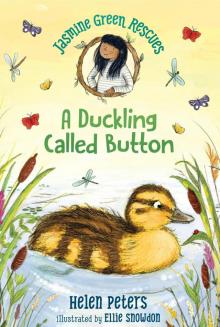 Jasmine Green Rescues A Duckling Called Button
Jasmine Green Rescues A Duckling Called Button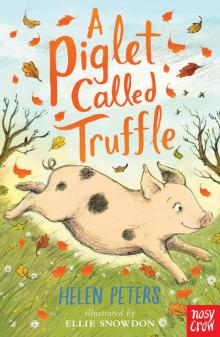 A Piglet Called Truffle
A Piglet Called Truffle A Deer Called Dotty
A Deer Called Dotty An Owl Called Star
An Owl Called Star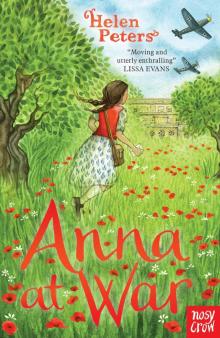 Anna At War
Anna At War The Secret Hen House Theatre
The Secret Hen House Theatre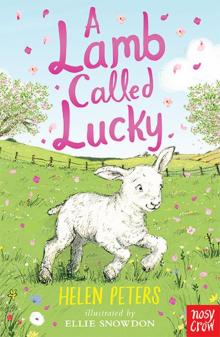 A Lamb Called Lucky
A Lamb Called Lucky The Farm Beneath the Water
The Farm Beneath the Water A Kitten Called Holly
A Kitten Called Holly Evie's Ghost
Evie's Ghost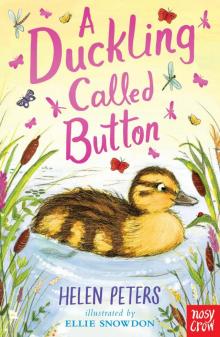 A Duckling Called Button
A Duckling Called Button